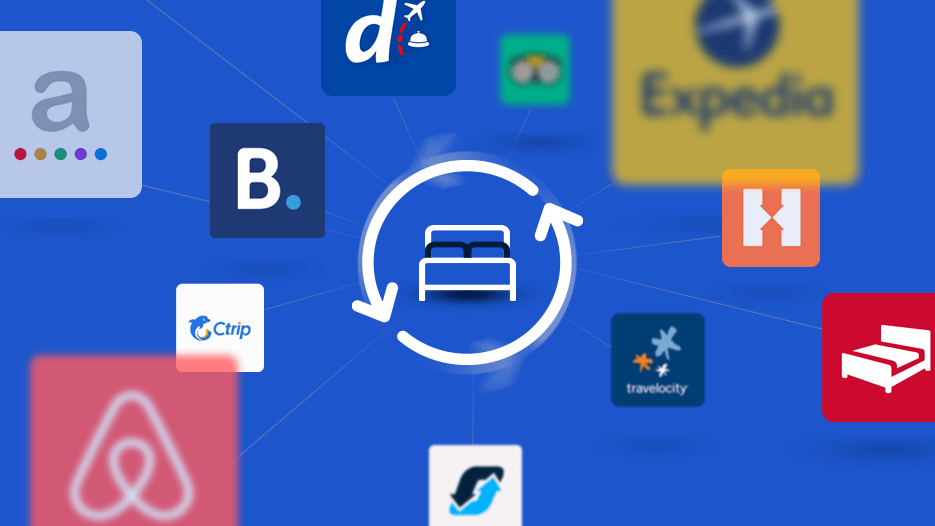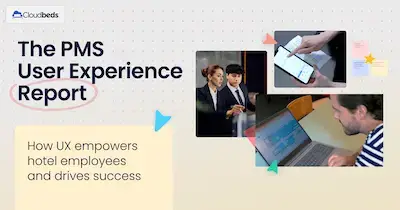
By Cloudbeds
Every hotelier and host faces the question – how can I increase hotel sales without raising prices or overspending?
When immersed in day-to-day operations, it can be hard to see the big picture, and getting the right answers can be complex. While there are many ways to increase your hotel revenue depending on your property’s needs, we’ve compiled 17 hotel sales strategies to get you started.
1. Build a road map
Before you can start building your revenue strategy, you need to know where your business currently stands, from your bottom line and revenue streams to marketing efforts and online review scores. Knowing the fixed cost of an available room is essential to calculate how to set the right rate plans, dates for promotions and group sales, and what OTA channels to be active on. With this information, you can create an accurate and personalized road map that will help guide your sales team in the right direction.
Your road map doesn’t have to be formal, but it should accurately reflect your business’s status in terms of finances, reservations, revenue, and costs so that you can plan appropriate goals for the future. Additionally, your road map or hotel business plan will need to be reviewed and revised every year by your sales manager to achieve optimal results.
2. Segment your target market
A key component of hotel marketing is defining your target audience and tailoring your sales process accordingly. You need to understand who your guests are, why they’re choosing to book with you, their booking process, and their main reason for travel so you can build an effective marketing strategy. The answers to these questions will help you develop guest segments and optimize your marketing and sales activities.
To illustrate, you might notice that your accommodation mainly attracts business travelers between the ages of 35 and 45 and that these guests choose to stay at your property because of your proximity to a convention center that hosts corporate events. Knowing this, you can run unique marketing campaigns and paid ads that promote your property’s optimal location and directly target business travelers.
You may notice you have different guest demographics depending on the season. If this is the case, you can add another guest persona and create appropriate marketing campaigns to target that group. Segmenting your guests and building targeted campaigns is strategic and will provide new ideas for increasing your hotel revenue.
3. Sell the experience over the transaction
In the saturated travel marketplace, it’s essential for hotel properties to showcase what makes them unique. As a hotelier, you need to put your property’s unique value proposition at the forefront of your website and social media accounts so potential guests can imagine their experience before they arrive. You may think this is hard to do if you have a basic accommodation, but the real differentiation is between offering a transaction and an experience. For example, have your front desk staff greet each guest by name and address them using it for the duration of their stay. These small initiatives can turn a transaction into an experience and boost guest satisfaction.
Providing a unique guest experience can become a part of your hotel’s value proposition. Staff should address your customers’ unmet needs and problems and make an effort to make them feel special. You’ll also need real-world evidence or customer reviews to help promote the unique offer that you provide. If you can find something to set your accommodation apart, you’ll, in turn, attract more hotel guests and boost revenue.
4. Maximize online reach with a channel manager
Looking to increase online bookings? A hotel channel manager’s main functionality is to distribute your room inventory across several different online travel agencies (OTAs) at once and sync hotel bookings to your property management system (PMS) in real time to optimize occupancy while avoiding overbookings. This means that you can sell the same room on different OTAs, like Booking.com, Expedia, TripAdvisor, etc., and as soon as a room is booked, availability will be removed from the other channels. A channel manager can connect your rooms to a broader audience, giving you more visibility, reaching more travelers, and ultimately increasing hotel revenue and occupancy.
Though using a channel manager is a great way to sell your room availability, you will have to pay a commission fee to the OTAs, therefore, it’s recommended that you use a mix of direct and indirect channels.

5. Build your direct channel with a booking engine
You can use a booking engine to counterbalance the reservations you get through OTAs and boost direct bookings that are commission-free and processed via your hotel website. A booking engine will allow visitors to book their reservations directly on your website or on social channels like your Facebook page. Optimize your hotel website pages for SEO to drive as much direct traffic to your website as possible.
With an integrated booking engine, potential guests have a seamless way to book their reservations or add-ons (room upgrades, late checkout, breakfast, and more). Always take advantage of cross-selling opportunities on your website.
Be sure to follow up a direct booking with a confirmation email to assure guests that your hotel is legitimate, and send communications closer to check-in as a welcome with detailed instructions.
6. Partner with local businesses
Building strong relationships with other businesses in the local community is another great way your hotel can generate more revenue.
To get started, research local businesses and who may benefit from a co-marketing arrangement. Many businesses and organizations can refer your accommodation, such as travel agencies, tour operators, conference centers, schools, and more. See if you can make a deal where they recommend your property in exchange for a commission fee.
Next, enhance your hotel’s package offerings. For example, you can advertise partnerships with local tour companies and offer add-ons. Co-creating clever packages in collaboration with local providers can lead to new upselling sources.
7. Try dynamic pricing
Regardless of your hotel type, you should regularly revisit your pricing plans and occupancy forecasting. As demand changes constantly, you should be able to adapt to the changing market conditions and react accordingly. Here’s where dynamic pricing can help.
Dynamic pricing in the hotel industry is the practice of using a flexible pricing strategy for a hotel room or service based on market demand, usually used to increase the price as demand increases. The basic concept behind dynamic pricing in a revenue management strategy is simple: a hotel room or a hostel bed will be priced based on supply and demand. Room rates should generally be increased when demand exceeds supply (to capitalize on ADR) and lowered when demand is weak (to increase occupancy).
Keeping up with upcoming events will help your estimates and enable you to reach your revenue potential, especially in the off-season. It also doesn’t hurt to keep tabs on competitor pricing – this can help you better predict demand and give you a competitive edge when deciding how to adjust your price.
8. Get mobile-friendly
Making your website responsive and adaptive for mobile is no longer an option; it’s a necessity. Data from Booking.com shows that almost half of room nights (48 percent) were booked on its mobile app, an all-time high. Simply put, if you want to get more bookings and increase hotel revenue, having a mobile-ready site is a necessity.
The widespread nature of mobile technology is also changing consumers’ expectations. It’s not enough to have a shrunken version of your website as your mobile page. Your mobile site needs to have a unique design. Millennials and Gen Z expect a speedy, sleek, and personalized mobile experience. If you don’t optimize your site for mobile, you’re missing out on a huge opportunity to grow your hotel’s occupancy rate.
9. Up your digital marketing game
Make sure you cover all the fundamental digital marketing channels. Firstly, ensure that your information is accurate and up-to-date wherever potential guests find you. From your social media networks and website to your Google My Business listing and OTA profiles, travelers will research your business online to check reviews or find specific information. Look up your property name on any search engine to see it through their eyes.
Secondly, you can use digital marketing tools to your advantage. You can create engaging social media campaigns, try a new social channel such as TikTok, or automate email campaigns aimed at returning guests or corporate partners.
To get the most out of your different social channels, ensure you are tracking specific metrics such as engagement, impressions, and reach to identify what strategies work well. Continually test and iterate on these to run successful digital marketing campaigns.
10. Use high-quality visuals
Few things will captivate travel planners more than high-quality images. Images of your property have the potential to visually tell a story and entice travelers to make a booking. Research has shown that 67% of consumers consider clear, detailed images to carry more weight than a long description (54%) and customer ratings and reviews (53%). Not to mention that many OTA sites will reject low-quality images, making it difficult to get your listing approved.
Your photos should help potential guests imagine themselves at your property. This emotional appeal will engage people more with your listing and help increase your revenue. A study from Expedia discovered that hotel listings with high-quality photos have a 63% higher click-through rate than those without. So, when it comes to images, it’s good to remember that the higher the quality, the higher the likelihood of conversion.
11. Attract group business
Depending on your property, you could attract large groups who prefer to book at larger hotels or smaller groups looking for a more personalized experience. Here’s how you can target these three types of group bookings:
Intimate weddings – many people have smaller wedding gatherings with fewer than 30 guests. Use photos from past events to showcase your property’s potential.
Family reunions – develop reunion-specific packages that may include custom menus and group room-rate discounts. These groups can often be a great opportunity for repeat business if it’s an annually hosted event.
Corporate groups – connect your property to a global distribution system (GDS) that will get your inventory in front of business travelers and their booking partners. Be sure to advertise your meeting spaces and coworking facilities if applicable.
To win group business you’ll have to invest in prospecting and become an expert at the RFP process. We’ve put together a comprehensive guide on group business to help you master this market segment.
12. Use hotel revenue management analytics
Having dependable revenue management technology can really give hoteliers a competitive advantage. These systems are beneficial for independent properties, where profit improvements can significantly impact total revenue. Here’s how revenue management software can improve your profit margin.
- Competitive advantage – automatically monitor your competitor’s rates, occupancy, and distribution channels.
- Demand forecasts – get real-time access to consumer demand, and you’ll be able to make updates to your pricing or room types.
- Avoid errors – revenue management systems also steer you away from errors, such as overpricing or underpricing your rooms.
- Automatic price updates – set rules and triggers that the system will execute automatically.
13. Implement stay restrictions
Rather than hiking rates or selling out quickly on busy nights, consider adding stay restrictions, such as closed-to-arrival or a minimum length of stay, to boost occupancy on shoulder nights.
Stay restrictions can be beneficial if events are going on in your city, such as concerts, conferences, or festivals, and over periods such as holiday weekends or spring break.
14. Optimize your inventory
Identify your different room types and categorize them to increase your revenue per available room (RevPAR). Charge premiums for not only suites and popular rooms but also for value-added features like larger rooms, a better view, preferred bed configurations, and attributes like balconies, fireplaces, wet bars, and pool access.
In addition to room inventory, properties must be aware of their secondary inventory or any other items you are providing guests. This ranges from toiletries to gift shops and restaurants on-site. Carefully monitor this inventory to ensure that you aren‘t being wasteful and ordering more than necessary.
15. Capture ancillary revenue
In the hospitality industry, there are many additional ways to increase guest spending through upsells and sales of room amenities, room service, incidentals, and special services. Consider adding in other services such as:
- Airport transportation
- Mini-bar stocked with drinks and snacks for purchase
- In-house laundry
- Paid breakfast
- Co-working spaces
- Guided tours
16. Prioritize guest reviews
Reviews matter more than almost anything in today’s world. Studies show that in 72% of cases, travelers will choose a hotel with a higher guest review score over one with a brand name or a lower price.
Therefore, it’s important to have a reputation management strategy in place to collect and respond to guest reviews. Collect feedback early on in a guest’s stay using surveys to identify areas for service recovery, and post-stay, always send a follow-up to foster relationships and collect reviews on the platforms of your choice (Google Business, Tripadvisor, etc.). By doing this you, you’ll boost your property’s SEO ranking and build trust and credibility with potential guests to increase occupancy and revenue.
17. Build guest loyalty
No matter how a guest stumbles upon your property, it’s up to you to foster that relationship to encourage recommendations and repeat stays. Ensure that you collect relevant details, including email, phone number, birthday, reason for staying, and communication preferences. Using this information, you can reach out mid-stay via guest messaging technology to offer upsells and add-ons, along with implementing remarketing tactics post-stay to build loyalty and entice guests to return.
It’s important not to bombard guests with communications. Instead, develop a loyalty program (it doesn’t have to be complicated) with ways you can add value through personalized offers and outreach. For example, on a guest’s birthday, send them a special happy birthday message along with a discount code and a free offer (like a spa treatment). These timely and relevant offers can build loyalty and increase hotel sales.
Final thoughts
When it comes to ways to increase your hotel revenue, you have many different tools and avenues to put together a customized plan, which you can build yourself or with the help of a professional revenue manager. With the tools and tactics listed above, you can get a head start on increasing your profit today.


















